Unit 2 I think that mooncakes are delicious 重要语法及练习(含答案)人教版九年级英语全册
文档属性
| 名称 | Unit 2 I think that mooncakes are delicious 重要语法及练习(含答案)人教版九年级英语全册 | 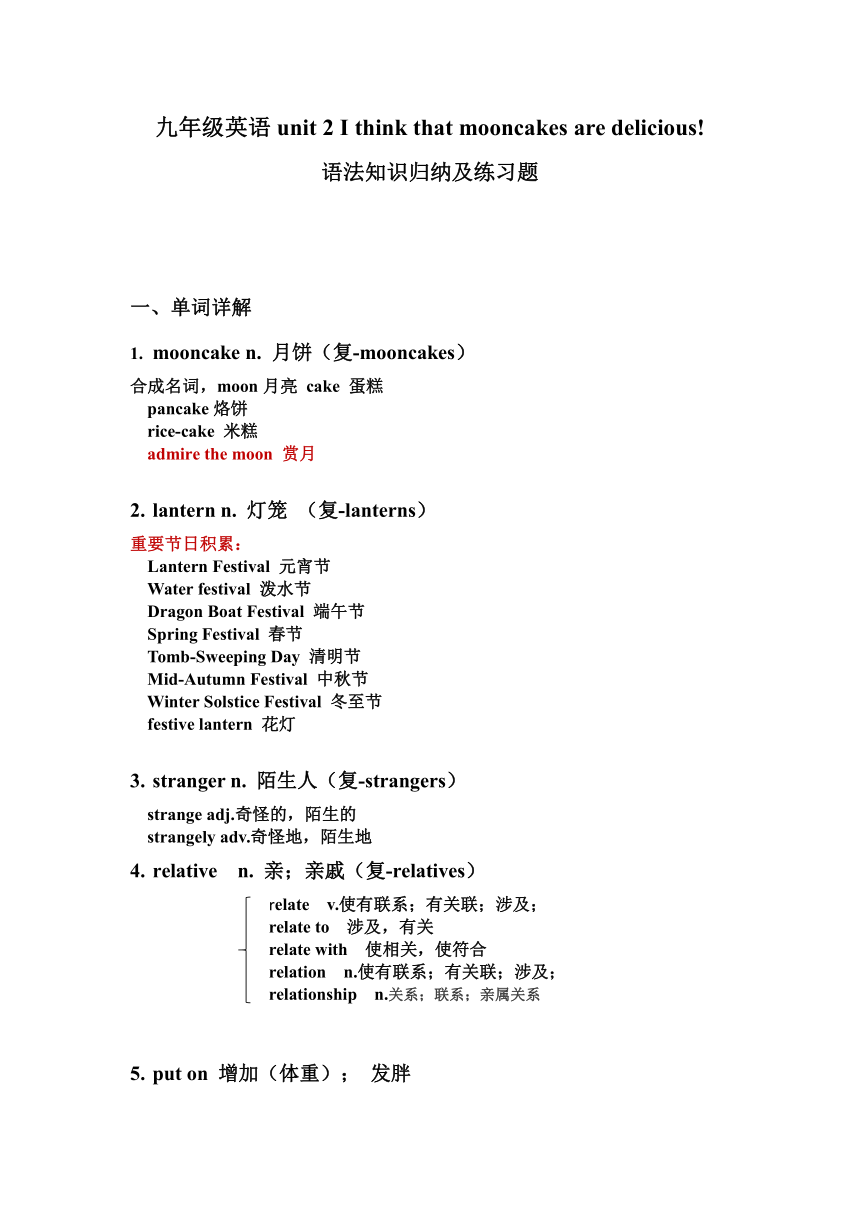 | |
| 格式 | docx | ||
| 文件大小 | 73.0KB | ||
| 资源类型 | 教案 | ||
| 版本资源 | 人教新目标(Go for it)版 | ||
| 科目 | 英语 | ||
| 更新时间 | 2024-05-09 07:11:40 | ||
图片预览

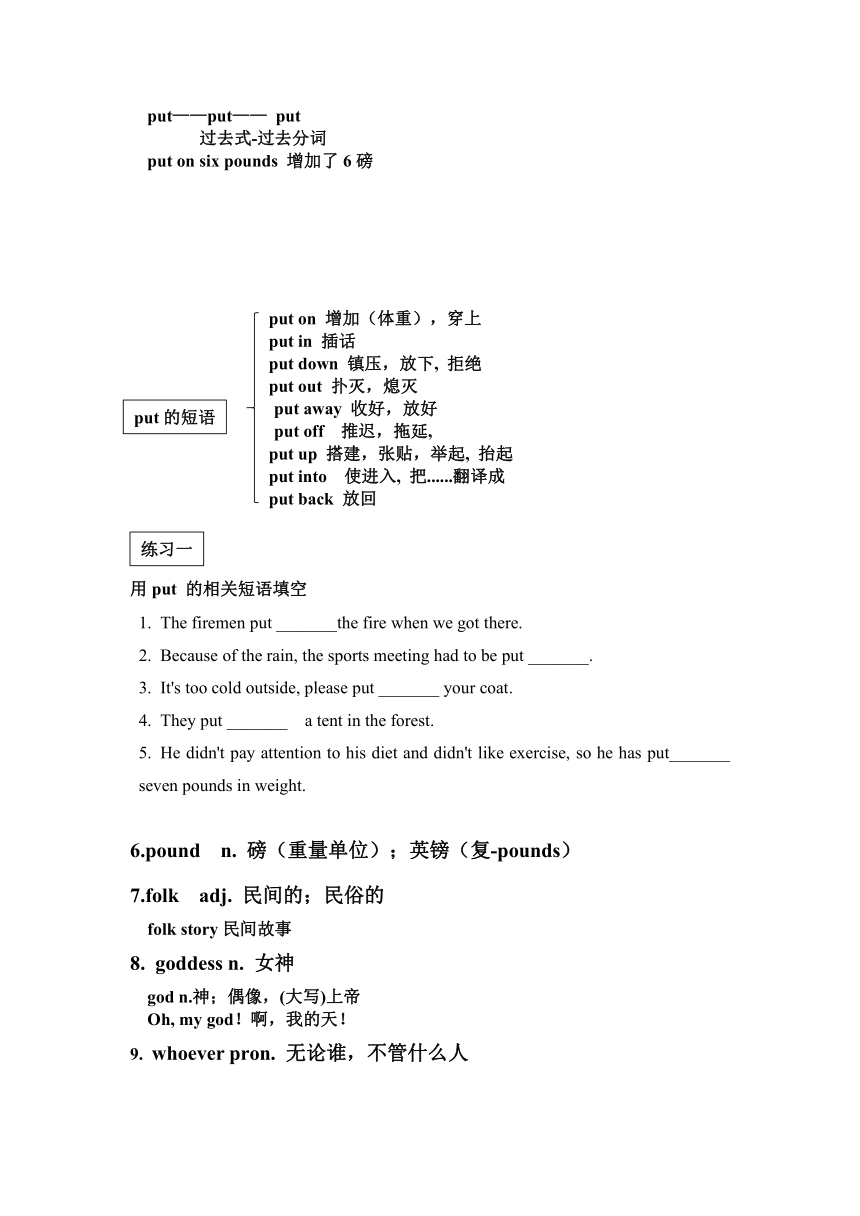
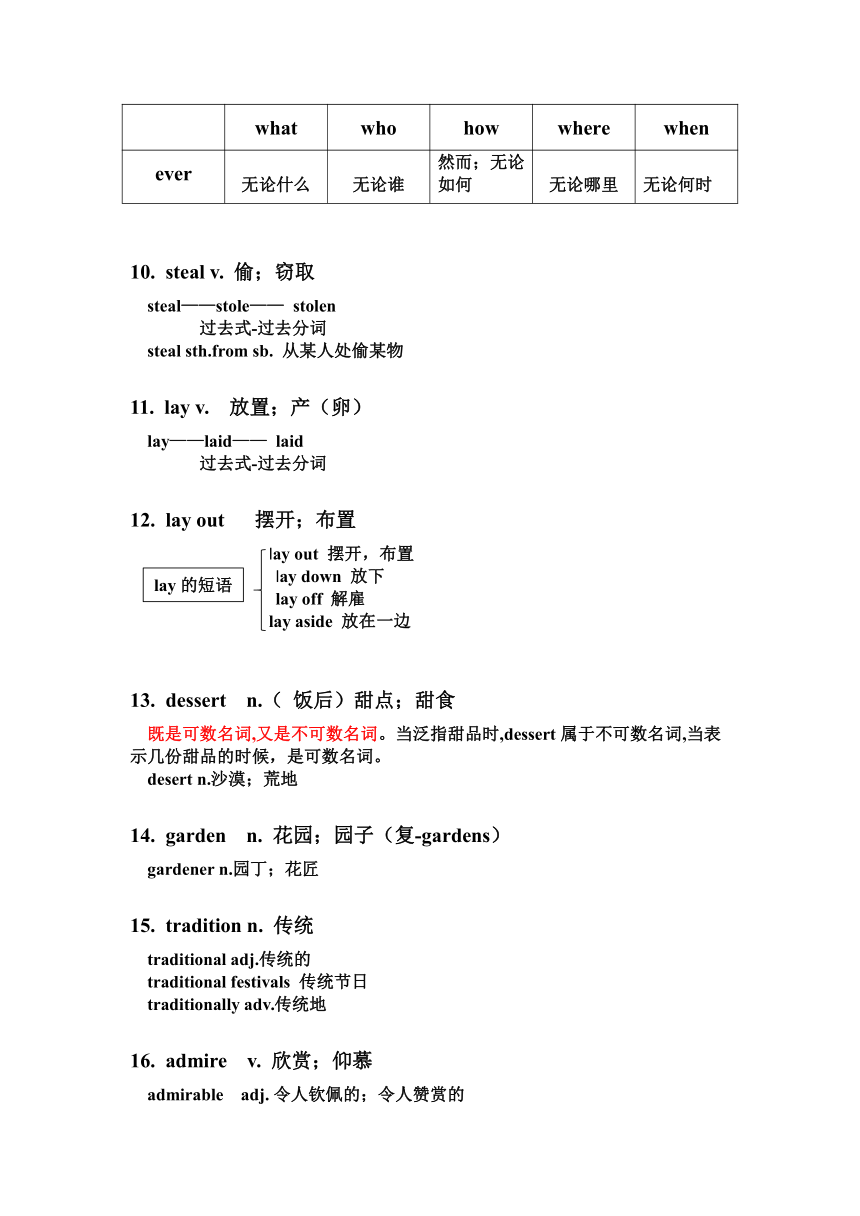
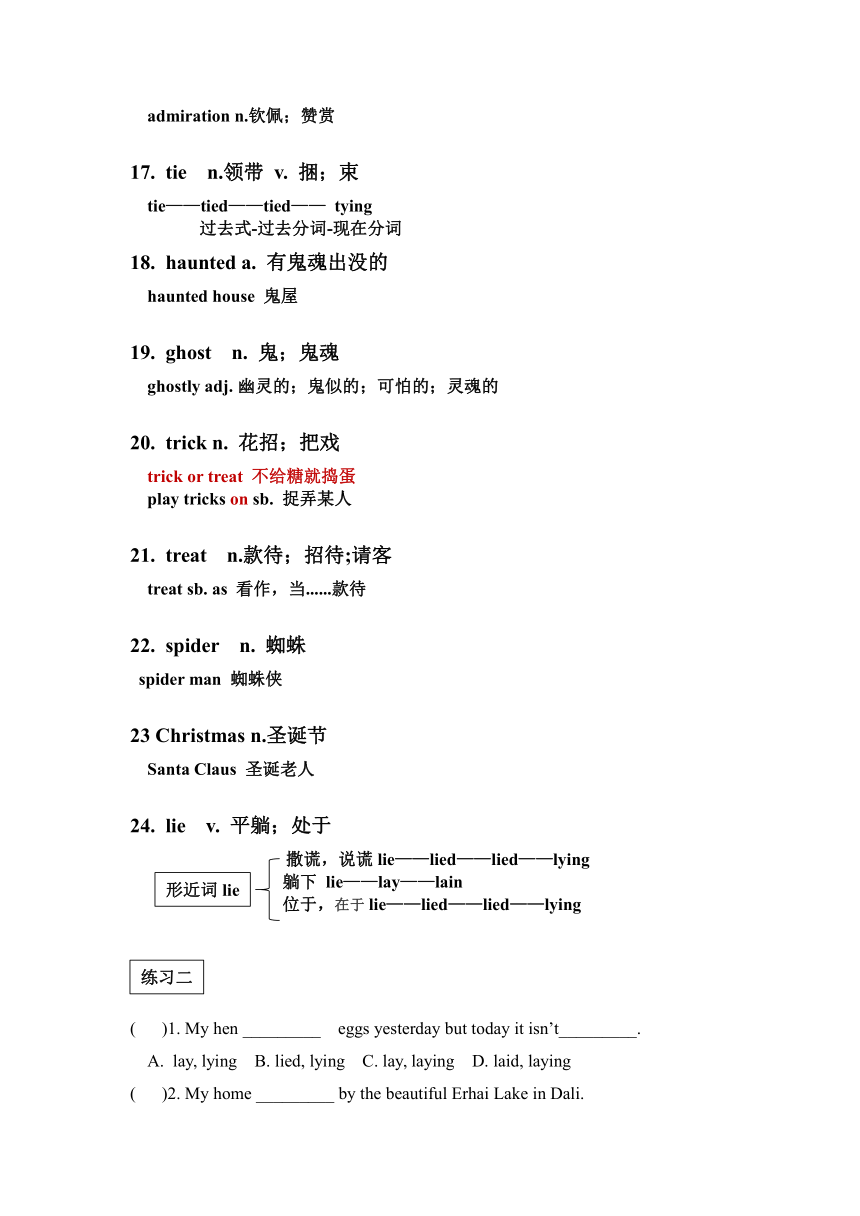
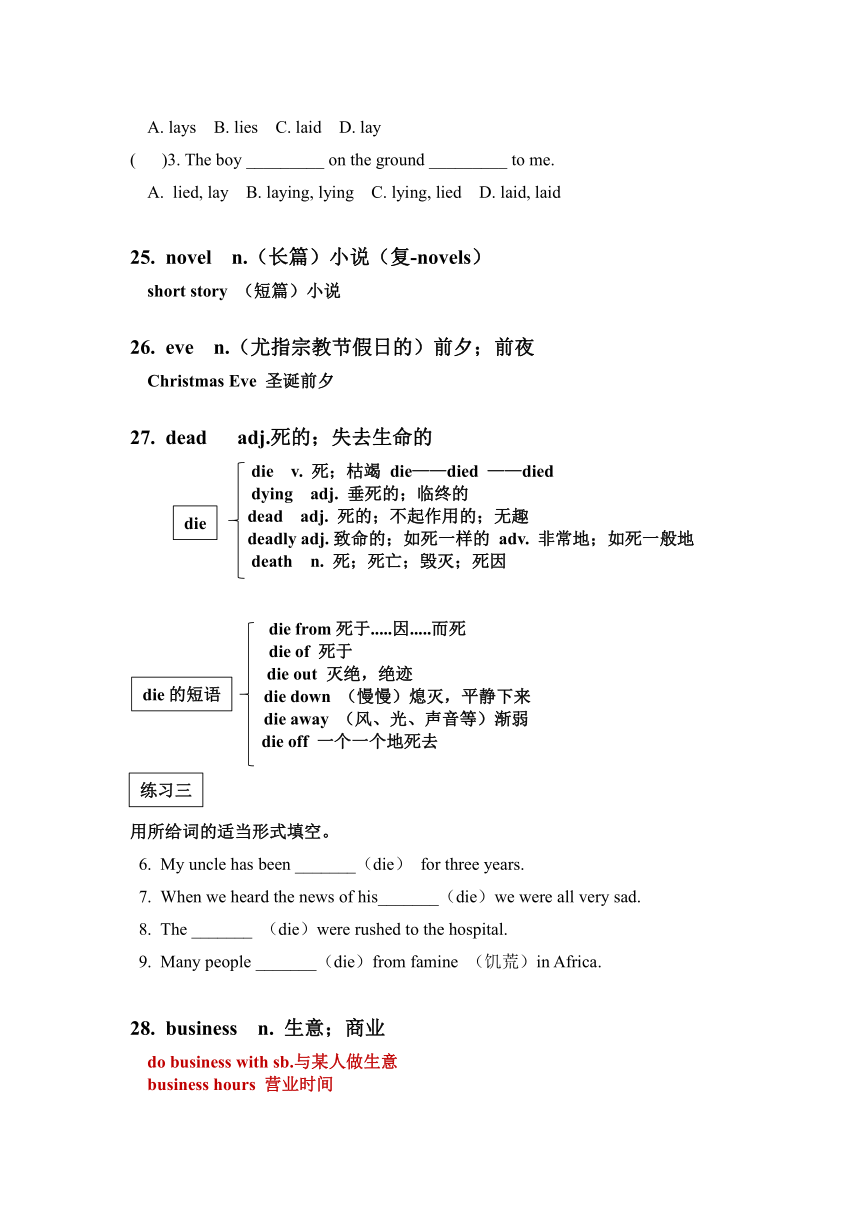
文档简介
九年级英语unit 2 I think that mooncakes are delicious!
语法知识归纳及练习题
一、单词详解
mooncake n. 月饼(复-mooncakes)
合成名词,moon月亮 cake 蛋糕
pancake烙饼
rice-cake 米糕
admire the moon 赏月
lantern n. 灯笼 (复-lanterns)
重要节日积累:
Lantern Festival 元宵节
Water festival 泼水节
Dragon Boat Festival 端午节
Spring Festival 春节
Tomb-Sweeping Day 清明节
Mid-Autumn Festival 中秋节
Winter Solstice Festival 冬至节
festive lantern 花灯
stranger n. 陌生人(复-strangers)
strange adj.奇怪的,陌生的
strangely adv.奇怪地,陌生地
relative n. 亲;亲戚(复-relatives)
relate v.使有联系;有关联;涉及;
relate to 涉及,有关
relate with 使相关,使符合
relation n.使有联系;有关联;涉及;
relationship n.关系;联系;亲属关系
put on 增加(体重); 发胖
put——put—— put
过去式-过去分词
put on six pounds 增加了6磅
put on 增加(体重),穿上
put in 插话
put down 镇压,放下, 拒绝
put out 扑灭,熄灭
put away 收好,放好
put off 推迟,拖延,
put up 搭建,张贴,举起, 抬起
put into 使进入, 把......翻译成
put back 放回
用put 的相关短语填空
The firemen put _______the fire when we got there.
Because of the rain, the sports meeting had to be put _______.
It's too cold outside, please put _______ your coat.
They put _______ a tent in the forest.
He didn't pay attention to his diet and didn't like exercise, so he has put_______ seven pounds in weight.
6.pound n. 磅(重量单位);英镑(复-pounds)
7.folk adj. 民间的;民俗的
folk story民间故事
goddess n. 女神
god n.神;偶像,(大写)上帝
Oh, my god!啊,我的天!
whoever pron. 无论谁,不管什么人
what who how where when
ever 无论什么 无论谁 然而;无论如何 无论哪里 无论何时
steal v. 偷;窃取
steal——stole—— stolen
过去式-过去分词
steal sth.from sb. 从某人处偷某物
lay v. 放置;产(卵)
lay——laid—— laid
过去式-过去分词
lay out 摆开;布置
lay out 摆开,布置
lay down 放下
lay off 解雇
lay aside 放在一边
dessert n.( 饭后)甜点;甜食
既是可数名词,又是不可数名词。当泛指甜品时,dessert属于不可数名词,当表示几份甜品的时候,是可数名词。
desert n.沙漠;荒地
garden n. 花园;园子(复-gardens)
gardener n.园丁;花匠
tradition n. 传统
traditional adj.传统的
traditional festivals 传统节日
traditionally adv.传统地
admire v. 欣赏;仰慕
admirable adj. 令人钦佩的;令人赞赏的
admiration n.钦佩;赞赏
tie n.领带 v. 捆;束
tie——tied——tied—— tying
过去式-过去分词-现在分词
haunted a. 有鬼魂出没的
haunted house 鬼屋
ghost n. 鬼;鬼魂
ghostly adj. 幽灵的;鬼似的;可怕的;灵魂的
trick n. 花招;把戏
trick or treat 不给糖就捣蛋
play tricks on sb. 捉弄某人
treat n.款待;招待;请客
treat sb. as 看作,当......款待
spider n. 蜘蛛
spider man 蜘蛛侠
23 Christmas n.圣诞节
Santa Claus 圣诞老人
lie v. 平躺;处于
撒谎,说谎lie——lied——lied——lying
躺下 lie——lay——lain
位于,在于lie——lied——lied——lying
( )1. My hen _________ eggs yesterday but today it isn’t_________.
lay, lying B. lied, lying C. lay, laying D. laid, laying
( )2. My home _________ by the beautiful Erhai Lake in Dali.
A. lays B. lies C. laid D. lay
( )3. The boy _________ on the ground _________ to me.
lied, lay B. laying, lying C. lying, lied D. laid, laid
novel n.(长篇)小说(复-novels)
short story (短篇)小说
eve n.(尤指宗教节假日的)前夕;前夜
Christmas Eve 圣诞前夕
dead adj.死的;失去生命的
die v. 死;枯竭 die——died ——died
dying adj. 垂死的;临终的
dead adj. 死的;不起作用的;无趣
deadly adj. 致命的;如死一样的 adv. 非常地;如死一般地
death n. 死;死亡;毁灭;死因
die from死于.....因.....而死
die of 死于
die out 灭绝,绝迹
die down (慢慢)熄灭,平静下来
die away (风、光、声音等)渐弱
die off 一个一个地死去
用所给词的适当形式填空。
My uncle has been _______(die) for three years.
When we heard the news of his_______(die)we were all very sad.
The _______ (die)were rushed to the hospital.
Many people _______(die)from famine (饥荒)in Africa.
business n. 生意;商业
do business with sb.与某人做生意
business hours 营业时间
businessman n.商人,生意人,企业家(复-businessmen)
busy adj. 忙的;繁忙的;热闹的;
busily adv. 繁忙地
be busy with sth.忙于某事
be busy(in)doing sth.忙于做某事
punish v. 处罚;惩罚
punish sb. for (doing)sth. 因(做)某事惩罚某人
punish sb. by doing sth. 通过做某事惩罚某人
warn v.警告;告诫
warn sb. not to do sth. 警告某人不要做某事
warn sb. of sth. 警告某人某事/物危险
end up 最终成为;最后成为
at the end 最后;在终点
at the end of 在......末端
by the end of 到......时为止; 在......之前
present n现在;礼物(复-presents) adj.现在的
at present 目前,现在
warmth n. 温暖;暖和
warm adj. 温暖的;暖和的;热情的
warm up 变暖; 活跃起来; 热身
warm-hearted adj.热心的,富有同情心的
spread v. 传播;展开 n. 蔓延;传播
spread out 散开,分数
spread...around...传播
二、重要短语
1.Lantern Festival 元宵节
2. Water festival 泼水节
3. Dragon Boat Festival 端午节
4. Spring Festival 春节
5. be back=come back 回来
6. eat out 出去吃饭
7. be similar to 与…相似
be similiar with:谁与谁相似。
be diffent from 和......不同
the same to 和......相同
8. wash away 冲走; 洗去; 忘却
9. good luck 祝你好运
10. Mid-Autumn Festival 中秋节
11. in the shape of 以 ... 形状; 通过 ... 方式
12. fly up 飞起;突然发怒
13. lay out 设计; 安排; 陈列;
14. call out 出动; 召集; 大声叫喊
15. admire the moon 赏月
16. take the medicine 吃药
17. shoot down 射落;击落;
18. one...the other 一个......剩下的一个......
19. take out 取出;拔掉;去掉;
20. dress up 穿上盛装;打扮得漂漂亮亮;伪装
21. haunted house 鬼屋
22. trick or treat 不给糖果就捣蛋
23. ask for 寻求,请求
24. a symbol of 一个......的标志
25. the spirit of ......的精神
26. care about 关心
相关短语: care for=take care of 照顾,照看
27. use to do 过去常常做...
28. end up 结束
29. wake up 唤醒
30. find out 查找,弄清楚
31. talk about 谈论
32. spread..around 传播 ; 扩散
33. between...and 在......和......之间
34. give out 分发
相关短语:
give away 赠送
give up 放弃
give off 释放,放出,发出(气体、热量、气味等)
give in 投降,屈服
give on 让步;(门、窗等)向着
35. give birth to 生育 ;使诞生
三、重要用法
(一)to do 及doing 结构
1. plan to do sth 计划做某事
2. refuse to do sth. 拒绝去做某事
hear sb. do sth 听见某人做某事
hear sb. doing sth.听见某人正在做某事
用所给词的适当形式填空
⑴ I heard someone _______(play)the violin in the music room.
⑵ I often hear him _______(tell)stories.
spend 花费;浪费;度过;用尽(气力等)
Sb. spend+时间 on sth.某人在某事/物上花费多少时间
Sb. Spend+时间 (in)doing sth.某人花费多少时间做某事
⑴It takes(took)+时间 for sb. to do sth.
形式主语 真正的主语
做某事花费某人多少时间
⑵物+cost(cost、cost)+钱(主语是物)
某物值多少钱
⑶Sb. spend(spends、spent)+钱 on sth.某人在某事/物上花费多少钱
主语是人
Sb. spend+时间(in)doing sth.某人花费多少时间做某事
⑷Sb.pay(pays、paid)+钱 for sth.(和for配套使用,主语是人)
某人为某物支付多少钱
用spend、take、pay、cost的正确形式填空
⑴ She often_______ too much effort on things that don't matter.
⑵ This watch _______twenty dollars.
⑶ It _______me three hours to do my homework.
⑷ I_______ a lot of money for this house.
help sb.(to)do sth.帮助某人做某事
hate to do sth.不喜欢做某事(动作)
hate doing sth. 讨厌做某事;憎恨做某事(状态)
use to do sth.过去常常做某事
be used to doing sth.习惯于做某事
be used to do sth.被用来做某事
want sb. to do sth.想要某人做某事
warn sb.not to do sth. 警告某人不要做某事
tell sb.to do sth.告诉某人做某事
expect sb. to do sth. 期望某人做某事
remind sb. to do sth. 提醒某人做某事
remind sb of doing sth. 使某人想起某事
decide to do sth.决定去做某事
用所给单词的适当形式填空填空
⑴ I refused _______(join)the sports club,because I don’t like sports.
⑵ Can you remind me _______ (buy)some bread
⑶ I am used to _______(play)basketball in the park after school
⑷ I used _______(go)to Xiao Ming's house to play, but now he has moved.
⑸ I plan_______(visit) my grandfather in Beijing this summer vacation。
⑹ I expect him successfully _______(solve)this difficult problem.
重要考点
感叹句(what或how引导,意为多......啊!多么......呀!)
What +a/an +adj.+可数名词单数+主语+谓语+其他!
【例】What a beautiful puppy it is(可省)!
它是多么漂亮的一只小狗啊!
What+adj.+可数名词复数+主语+谓语+其他!
【例】What important jobs they have done!
他们真的做了多么重要的工作啊!
What+adj+不可数名词+主语+谓语+其他!
【例】What delicious bread!
多么好吃的面包呀!
How+adj/adv+主语+谓语!
【例】How smart she is!
她真的很聪明!
How+adj+a/an+可数名词单数+主语+谓语!
【例】How cute a girl she is!
她是多么可爱的一个女孩啊!
How主语+谓语!
【例】How time flies!
时光飞逝!
宾语从句
⑴宾语从句的几种类型
①主语+谓语(及物动词)+宾语(宾从).
【例】I think(that)she is really a great person.
我觉得她真的是一个很棒的人。
②主语+谓语+宾语+宾补(宾从)
【例】I have made it a habit that I play sports every day.
我养成了每天运动的习惯。
③主语+谓语(及物动词)+间接宾语+直接宾语(宾从)
【例】Please tell me which you like.
告诉我你喜欢哪一个。
④主语+谓语(不及物动词)+介词+宾语(宾语从句)
【例】We are talking about whether we should hold the sports meeting next week.
我们正在讨论是否应该在下周举行运动会。
⑤主语+be动词+adj+宾从
【例】I'm not sure whether we should go to the beach or not.
我不确定我们是否应该去海滩。
⑵宾语从句的连接词
①单纯连词
that:无意思,不充当句子的成分,只起连接作用,在非正式文体中可省。
if、whether:意为“是否”,有意思,不充当句子的成分,起连接作用。
在介词后通常后whether,不用if;
与or not连用时,用whether,不用if;
与动词不定式连用时,用whether,不用if;
宾语从句位于句首时,用whether,不用if。
②连接代词
who;whom;which;what;whose;whoever(无论谁);whatever(无论什么);whomever(无论谁); whichever(无论哪一个)等。
③连接副词
where;when;why;how;whenever(无论什么时候);however(无论怎样);wherever(无论哪里)等。
⑶宾语从句的语序:要用陈述句语序。
【例】I wonder whether June is a good time to visit Hong Kong.
我想知道六月是否是访问香港的好时机。
【例】I know that the Water Festival is really fun.
我知道泼水节真的很有趣。
陈述句语序:主语+谓语+宾语或主语+系动词+表语等等,即主语在谓语动词或系动词之前。
疑问句语序:系动词/助动词/情态动词+主语+其他?
Is he a student 疑问句
He is a student.陈述句
√I heard what he just said.我听见了他刚刚说的话。
×I heard what did he just say.
⑷宾语从句的时态
①“主过从过”,主句用一般过去式,从句也要用过去的时态(一般过去式、过去完成时、过去进行时等)
【例】I heard(that)he used to teach elementary school English in the countryside.我听说他过去在乡村教小学英语。
【例】He told me that the meeting had already started a long time ago.他告诉我会议早就已经开始了。
②“主现从不限”,主句用一般现在时,从句的时态要根据后面的句意判断用什么时态。
【例】I wonder if she will come back tomorrow.
我想知道明天她是否会回来。(因为从句中有表示将来的时间状语tomorrow,所以从句用一般将来时。)
【例】I know you don't know him.
我知道你不认识他。
③如果宾语从句所陈述的是客观真理、自然现象、公式、定理、名人名言等,那么宾语从句要用一般现在时。
【例】She told me that the earth is round.
她告诉我地球是圆的。
课后练习
( )1. _________ important it is for children to receive good education!
What a B. What C. How D. What an
( )2._________ delicious cake! Would you like one?
What B. What a C. What an D. How
( )3._________boring the news is!
How B. What C. How a D. What an
( )4. _________ useful imformation it is!
How B. What a C. What an D. What
( )5._________fine weather! Let's go swimming!
How B. What C. What a D. How a
( )6._________ fun the Water Festival is!
How B. What C. What a D. How a
( )7.________interesting city Kunming is!
How an B. What a C. What D. What an
( )8.________fat sheep!
A.What an B. What a C. What D. How a
( )1.I’m new here.Could you tell me ________?
how can I get to the forest park B. where can I get to the forest park
C. how I can get to the forest park D. where I can get to the forest park
( )2. I want to know ________ in sixty years?
what our lives are like B. what are our lives like
what will our lives be like D. what our lives will be like
( )3.I believe ________she can win first prize in the painting competition.
whether B./ C. what D. if
( )4. Could you tell me ________ broke the glass in the classroom?
A. who B.whom C. whose D. what
( )5. —What did Lily say to you just now________?
—She asked me________.
if I have passed for the English exam
B. when I go to her party
C. where I will plan to
D. why I was late for school
( )6.He asked me ________we could go to Beijing by train?
how B. where C. if D. that
( )7. —May I come in?I’m sorry I am late.
—Come in,please.But could you please tell me________?
who you talked with B. why you were late again
C. what were you doing then D. how do you come to school
( )8.I wonder________.
how much these socks cost B. how much cost these socks
C. how much do these socks cost D. how much do these socks cost
( )9.I didn’t know________ they could pass the exam or not.
A.if B. whether C. why D. that
( )10. The teacher told us _______?
that the earth travels around the sun
B. that does the earth travel around the sun
C. that the earth traveled around the sun
D. that did the earth travel around the sun
参考答案
练习一
out off on up on
练习二
DBC
练习三
dead death dying dies
练习四
playing tell
练习五
spends costs took paid
练习六
to join to buy playing to go to visit to solve
课后练习
感叹句
1-5 CBADB
6-8 BDC
宾语从句
1-5 CDBAD
6-10 CBABA
语法知识归纳及练习题
一、单词详解
mooncake n. 月饼(复-mooncakes)
合成名词,moon月亮 cake 蛋糕
pancake烙饼
rice-cake 米糕
admire the moon 赏月
lantern n. 灯笼 (复-lanterns)
重要节日积累:
Lantern Festival 元宵节
Water festival 泼水节
Dragon Boat Festival 端午节
Spring Festival 春节
Tomb-Sweeping Day 清明节
Mid-Autumn Festival 中秋节
Winter Solstice Festival 冬至节
festive lantern 花灯
stranger n. 陌生人(复-strangers)
strange adj.奇怪的,陌生的
strangely adv.奇怪地,陌生地
relative n. 亲;亲戚(复-relatives)
relate v.使有联系;有关联;涉及;
relate to 涉及,有关
relate with 使相关,使符合
relation n.使有联系;有关联;涉及;
relationship n.关系;联系;亲属关系
put on 增加(体重); 发胖
put——put—— put
过去式-过去分词
put on six pounds 增加了6磅
put on 增加(体重),穿上
put in 插话
put down 镇压,放下, 拒绝
put out 扑灭,熄灭
put away 收好,放好
put off 推迟,拖延,
put up 搭建,张贴,举起, 抬起
put into 使进入, 把......翻译成
put back 放回
用put 的相关短语填空
The firemen put _______the fire when we got there.
Because of the rain, the sports meeting had to be put _______.
It's too cold outside, please put _______ your coat.
They put _______ a tent in the forest.
He didn't pay attention to his diet and didn't like exercise, so he has put_______ seven pounds in weight.
6.pound n. 磅(重量单位);英镑(复-pounds)
7.folk adj. 民间的;民俗的
folk story民间故事
goddess n. 女神
god n.神;偶像,(大写)上帝
Oh, my god!啊,我的天!
whoever pron. 无论谁,不管什么人
what who how where when
ever 无论什么 无论谁 然而;无论如何 无论哪里 无论何时
steal v. 偷;窃取
steal——stole—— stolen
过去式-过去分词
steal sth.from sb. 从某人处偷某物
lay v. 放置;产(卵)
lay——laid—— laid
过去式-过去分词
lay out 摆开;布置
lay out 摆开,布置
lay down 放下
lay off 解雇
lay aside 放在一边
dessert n.( 饭后)甜点;甜食
既是可数名词,又是不可数名词。当泛指甜品时,dessert属于不可数名词,当表示几份甜品的时候,是可数名词。
desert n.沙漠;荒地
garden n. 花园;园子(复-gardens)
gardener n.园丁;花匠
tradition n. 传统
traditional adj.传统的
traditional festivals 传统节日
traditionally adv.传统地
admire v. 欣赏;仰慕
admirable adj. 令人钦佩的;令人赞赏的
admiration n.钦佩;赞赏
tie n.领带 v. 捆;束
tie——tied——tied—— tying
过去式-过去分词-现在分词
haunted a. 有鬼魂出没的
haunted house 鬼屋
ghost n. 鬼;鬼魂
ghostly adj. 幽灵的;鬼似的;可怕的;灵魂的
trick n. 花招;把戏
trick or treat 不给糖就捣蛋
play tricks on sb. 捉弄某人
treat n.款待;招待;请客
treat sb. as 看作,当......款待
spider n. 蜘蛛
spider man 蜘蛛侠
23 Christmas n.圣诞节
Santa Claus 圣诞老人
lie v. 平躺;处于
撒谎,说谎lie——lied——lied——lying
躺下 lie——lay——lain
位于,在于lie——lied——lied——lying
( )1. My hen _________ eggs yesterday but today it isn’t_________.
lay, lying B. lied, lying C. lay, laying D. laid, laying
( )2. My home _________ by the beautiful Erhai Lake in Dali.
A. lays B. lies C. laid D. lay
( )3. The boy _________ on the ground _________ to me.
lied, lay B. laying, lying C. lying, lied D. laid, laid
novel n.(长篇)小说(复-novels)
short story (短篇)小说
eve n.(尤指宗教节假日的)前夕;前夜
Christmas Eve 圣诞前夕
dead adj.死的;失去生命的
die v. 死;枯竭 die——died ——died
dying adj. 垂死的;临终的
dead adj. 死的;不起作用的;无趣
deadly adj. 致命的;如死一样的 adv. 非常地;如死一般地
death n. 死;死亡;毁灭;死因
die from死于.....因.....而死
die of 死于
die out 灭绝,绝迹
die down (慢慢)熄灭,平静下来
die away (风、光、声音等)渐弱
die off 一个一个地死去
用所给词的适当形式填空。
My uncle has been _______(die) for three years.
When we heard the news of his_______(die)we were all very sad.
The _______ (die)were rushed to the hospital.
Many people _______(die)from famine (饥荒)in Africa.
business n. 生意;商业
do business with sb.与某人做生意
business hours 营业时间
businessman n.商人,生意人,企业家(复-businessmen)
busy adj. 忙的;繁忙的;热闹的;
busily adv. 繁忙地
be busy with sth.忙于某事
be busy(in)doing sth.忙于做某事
punish v. 处罚;惩罚
punish sb. for (doing)sth. 因(做)某事惩罚某人
punish sb. by doing sth. 通过做某事惩罚某人
warn v.警告;告诫
warn sb. not to do sth. 警告某人不要做某事
warn sb. of sth. 警告某人某事/物危险
end up 最终成为;最后成为
at the end 最后;在终点
at the end of 在......末端
by the end of 到......时为止; 在......之前
present n现在;礼物(复-presents) adj.现在的
at present 目前,现在
warmth n. 温暖;暖和
warm adj. 温暖的;暖和的;热情的
warm up 变暖; 活跃起来; 热身
warm-hearted adj.热心的,富有同情心的
spread v. 传播;展开 n. 蔓延;传播
spread out 散开,分数
spread...around...传播
二、重要短语
1.Lantern Festival 元宵节
2. Water festival 泼水节
3. Dragon Boat Festival 端午节
4. Spring Festival 春节
5. be back=come back 回来
6. eat out 出去吃饭
7. be similar to 与…相似
be similiar with:谁与谁相似。
be diffent from 和......不同
the same to 和......相同
8. wash away 冲走; 洗去; 忘却
9. good luck 祝你好运
10. Mid-Autumn Festival 中秋节
11. in the shape of 以 ... 形状; 通过 ... 方式
12. fly up 飞起;突然发怒
13. lay out 设计; 安排; 陈列;
14. call out 出动; 召集; 大声叫喊
15. admire the moon 赏月
16. take the medicine 吃药
17. shoot down 射落;击落;
18. one...the other 一个......剩下的一个......
19. take out 取出;拔掉;去掉;
20. dress up 穿上盛装;打扮得漂漂亮亮;伪装
21. haunted house 鬼屋
22. trick or treat 不给糖果就捣蛋
23. ask for 寻求,请求
24. a symbol of 一个......的标志
25. the spirit of ......的精神
26. care about 关心
相关短语: care for=take care of 照顾,照看
27. use to do 过去常常做...
28. end up 结束
29. wake up 唤醒
30. find out 查找,弄清楚
31. talk about 谈论
32. spread..around 传播 ; 扩散
33. between...and 在......和......之间
34. give out 分发
相关短语:
give away 赠送
give up 放弃
give off 释放,放出,发出(气体、热量、气味等)
give in 投降,屈服
give on 让步;(门、窗等)向着
35. give birth to 生育 ;使诞生
三、重要用法
(一)to do 及doing 结构
1. plan to do sth 计划做某事
2. refuse to do sth. 拒绝去做某事
hear sb. do sth 听见某人做某事
hear sb. doing sth.听见某人正在做某事
用所给词的适当形式填空
⑴ I heard someone _______(play)the violin in the music room.
⑵ I often hear him _______(tell)stories.
spend 花费;浪费;度过;用尽(气力等)
Sb. spend+时间 on sth.某人在某事/物上花费多少时间
Sb. Spend+时间 (in)doing sth.某人花费多少时间做某事
⑴It takes(took)+时间 for sb. to do sth.
形式主语 真正的主语
做某事花费某人多少时间
⑵物+cost(cost、cost)+钱(主语是物)
某物值多少钱
⑶Sb. spend(spends、spent)+钱 on sth.某人在某事/物上花费多少钱
主语是人
Sb. spend+时间(in)doing sth.某人花费多少时间做某事
⑷Sb.pay(pays、paid)+钱 for sth.(和for配套使用,主语是人)
某人为某物支付多少钱
用spend、take、pay、cost的正确形式填空
⑴ She often_______ too much effort on things that don't matter.
⑵ This watch _______twenty dollars.
⑶ It _______me three hours to do my homework.
⑷ I_______ a lot of money for this house.
help sb.(to)do sth.帮助某人做某事
hate to do sth.不喜欢做某事(动作)
hate doing sth. 讨厌做某事;憎恨做某事(状态)
use to do sth.过去常常做某事
be used to doing sth.习惯于做某事
be used to do sth.被用来做某事
want sb. to do sth.想要某人做某事
warn sb.not to do sth. 警告某人不要做某事
tell sb.to do sth.告诉某人做某事
expect sb. to do sth. 期望某人做某事
remind sb. to do sth. 提醒某人做某事
remind sb of doing sth. 使某人想起某事
decide to do sth.决定去做某事
用所给单词的适当形式填空填空
⑴ I refused _______(join)the sports club,because I don’t like sports.
⑵ Can you remind me _______ (buy)some bread
⑶ I am used to _______(play)basketball in the park after school
⑷ I used _______(go)to Xiao Ming's house to play, but now he has moved.
⑸ I plan_______(visit) my grandfather in Beijing this summer vacation。
⑹ I expect him successfully _______(solve)this difficult problem.
重要考点
感叹句(what或how引导,意为多......啊!多么......呀!)
What +a/an +adj.+可数名词单数+主语+谓语+其他!
【例】What a beautiful puppy it is(可省)!
它是多么漂亮的一只小狗啊!
What+adj.+可数名词复数+主语+谓语+其他!
【例】What important jobs they have done!
他们真的做了多么重要的工作啊!
What+adj+不可数名词+主语+谓语+其他!
【例】What delicious bread!
多么好吃的面包呀!
How+adj/adv+主语+谓语!
【例】How smart she is!
她真的很聪明!
How+adj+a/an+可数名词单数+主语+谓语!
【例】How cute a girl she is!
她是多么可爱的一个女孩啊!
How主语+谓语!
【例】How time flies!
时光飞逝!
宾语从句
⑴宾语从句的几种类型
①主语+谓语(及物动词)+宾语(宾从).
【例】I think(that)she is really a great person.
我觉得她真的是一个很棒的人。
②主语+谓语+宾语+宾补(宾从)
【例】I have made it a habit that I play sports every day.
我养成了每天运动的习惯。
③主语+谓语(及物动词)+间接宾语+直接宾语(宾从)
【例】Please tell me which you like.
告诉我你喜欢哪一个。
④主语+谓语(不及物动词)+介词+宾语(宾语从句)
【例】We are talking about whether we should hold the sports meeting next week.
我们正在讨论是否应该在下周举行运动会。
⑤主语+be动词+adj+宾从
【例】I'm not sure whether we should go to the beach or not.
我不确定我们是否应该去海滩。
⑵宾语从句的连接词
①单纯连词
that:无意思,不充当句子的成分,只起连接作用,在非正式文体中可省。
if、whether:意为“是否”,有意思,不充当句子的成分,起连接作用。
在介词后通常后whether,不用if;
与or not连用时,用whether,不用if;
与动词不定式连用时,用whether,不用if;
宾语从句位于句首时,用whether,不用if。
②连接代词
who;whom;which;what;whose;whoever(无论谁);whatever(无论什么);whomever(无论谁); whichever(无论哪一个)等。
③连接副词
where;when;why;how;whenever(无论什么时候);however(无论怎样);wherever(无论哪里)等。
⑶宾语从句的语序:要用陈述句语序。
【例】I wonder whether June is a good time to visit Hong Kong.
我想知道六月是否是访问香港的好时机。
【例】I know that the Water Festival is really fun.
我知道泼水节真的很有趣。
陈述句语序:主语+谓语+宾语或主语+系动词+表语等等,即主语在谓语动词或系动词之前。
疑问句语序:系动词/助动词/情态动词+主语+其他?
Is he a student 疑问句
He is a student.陈述句
√I heard what he just said.我听见了他刚刚说的话。
×I heard what did he just say.
⑷宾语从句的时态
①“主过从过”,主句用一般过去式,从句也要用过去的时态(一般过去式、过去完成时、过去进行时等)
【例】I heard(that)he used to teach elementary school English in the countryside.我听说他过去在乡村教小学英语。
【例】He told me that the meeting had already started a long time ago.他告诉我会议早就已经开始了。
②“主现从不限”,主句用一般现在时,从句的时态要根据后面的句意判断用什么时态。
【例】I wonder if she will come back tomorrow.
我想知道明天她是否会回来。(因为从句中有表示将来的时间状语tomorrow,所以从句用一般将来时。)
【例】I know you don't know him.
我知道你不认识他。
③如果宾语从句所陈述的是客观真理、自然现象、公式、定理、名人名言等,那么宾语从句要用一般现在时。
【例】She told me that the earth is round.
她告诉我地球是圆的。
课后练习
( )1. _________ important it is for children to receive good education!
What a B. What C. How D. What an
( )2._________ delicious cake! Would you like one?
What B. What a C. What an D. How
( )3._________boring the news is!
How B. What C. How a D. What an
( )4. _________ useful imformation it is!
How B. What a C. What an D. What
( )5._________fine weather! Let's go swimming!
How B. What C. What a D. How a
( )6._________ fun the Water Festival is!
How B. What C. What a D. How a
( )7.________interesting city Kunming is!
How an B. What a C. What D. What an
( )8.________fat sheep!
A.What an B. What a C. What D. How a
( )1.I’m new here.Could you tell me ________?
how can I get to the forest park B. where can I get to the forest park
C. how I can get to the forest park D. where I can get to the forest park
( )2. I want to know ________ in sixty years?
what our lives are like B. what are our lives like
what will our lives be like D. what our lives will be like
( )3.I believe ________she can win first prize in the painting competition.
whether B./ C. what D. if
( )4. Could you tell me ________ broke the glass in the classroom?
A. who B.whom C. whose D. what
( )5. —What did Lily say to you just now________?
—She asked me________.
if I have passed for the English exam
B. when I go to her party
C. where I will plan to
D. why I was late for school
( )6.He asked me ________we could go to Beijing by train?
how B. where C. if D. that
( )7. —May I come in?I’m sorry I am late.
—Come in,please.But could you please tell me________?
who you talked with B. why you were late again
C. what were you doing then D. how do you come to school
( )8.I wonder________.
how much these socks cost B. how much cost these socks
C. how much do these socks cost D. how much do these socks cost
( )9.I didn’t know________ they could pass the exam or not.
A.if B. whether C. why D. that
( )10. The teacher told us _______?
that the earth travels around the sun
B. that does the earth travel around the sun
C. that the earth traveled around the sun
D. that did the earth travel around the sun
参考答案
练习一
out off on up on
练习二
DBC
练习三
dead death dying dies
练习四
playing tell
练习五
spends costs took paid
练习六
to join to buy playing to go to visit to solve
课后练习
感叹句
1-5 CBADB
6-8 BDC
宾语从句
1-5 CDBAD
6-10 CBABA
同课章节目录
- Unit 1 How can we become good learners.
- Section A
- Section B
- Unit 2 I think that mooncakes are delicious!
- Section A
- Section B
- Unit 3 Could you please tell me where the restroom
- Section A
- Section B
- Unit 4 I used to be afraid of the dark.
- Section A
- Section B
- Unit 5 What are the shirts made of?
- Section A
- Section B
- Review of Units 1-5
- Unit 6 When was it invented?
- Section A
- Section B
- Unit 7 Teenagers should be allowed to choose their
- Section A
- Section B
- Unit 8 It must belong to Carla.
- Section A
- Section B
- Unit 9 I like music that I can dance to.
- Section A
- Section B
- Unit 10 You're supposed to shake hands.
- Section A
- Section B
- Review of Units 6-10
- Unit 11 Sad movies make me cry.
- Section A
- Section B
- Unit 12 Life is full of the unexpected
- Section A
- Section B
- Unit 13 We're trying to save the earth!
- Section A
- Section B
- Unit 14 I remember meeting all of you in Grade 7.
- Section A
- Section B
- Review of Units 11-14
